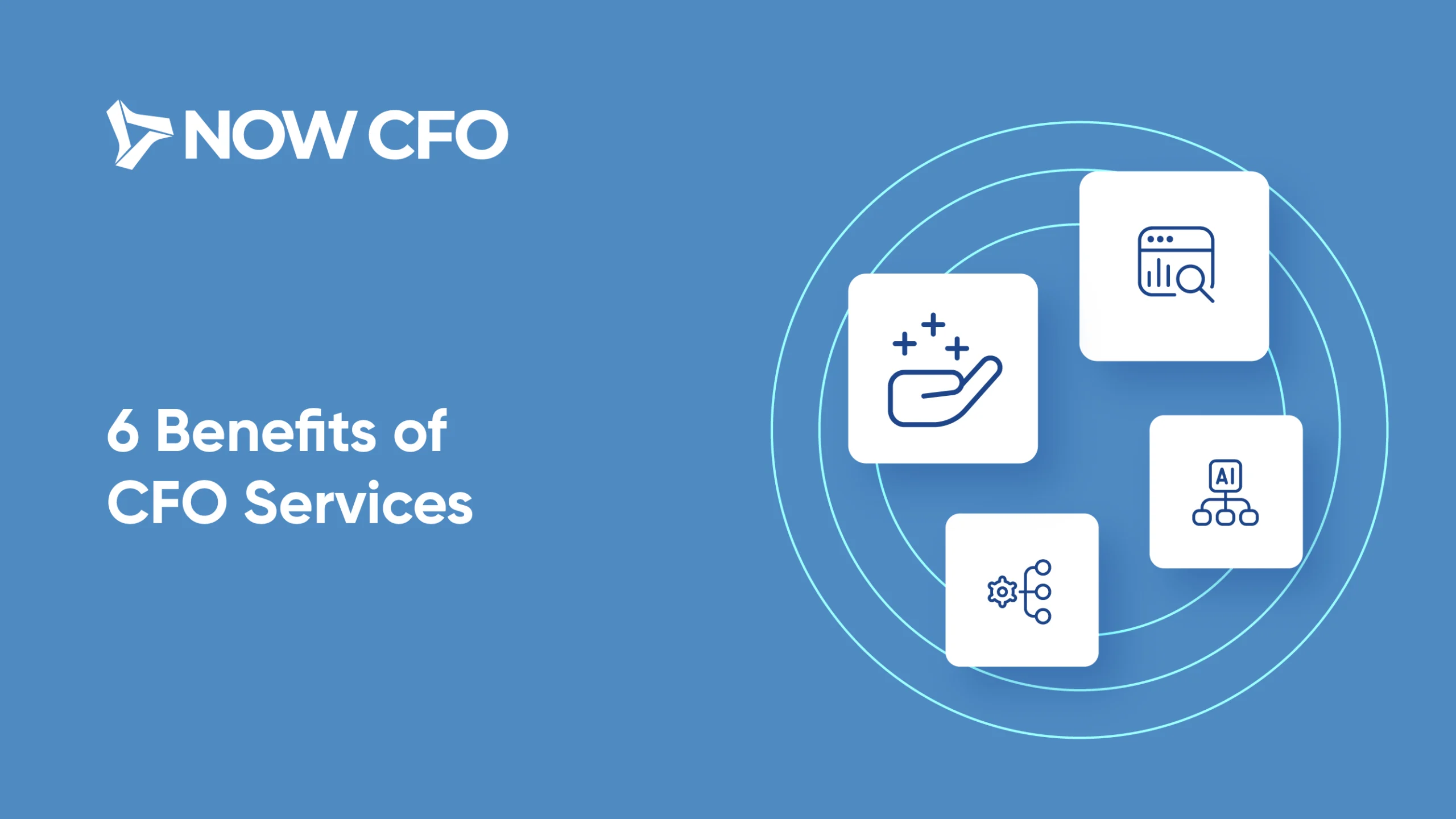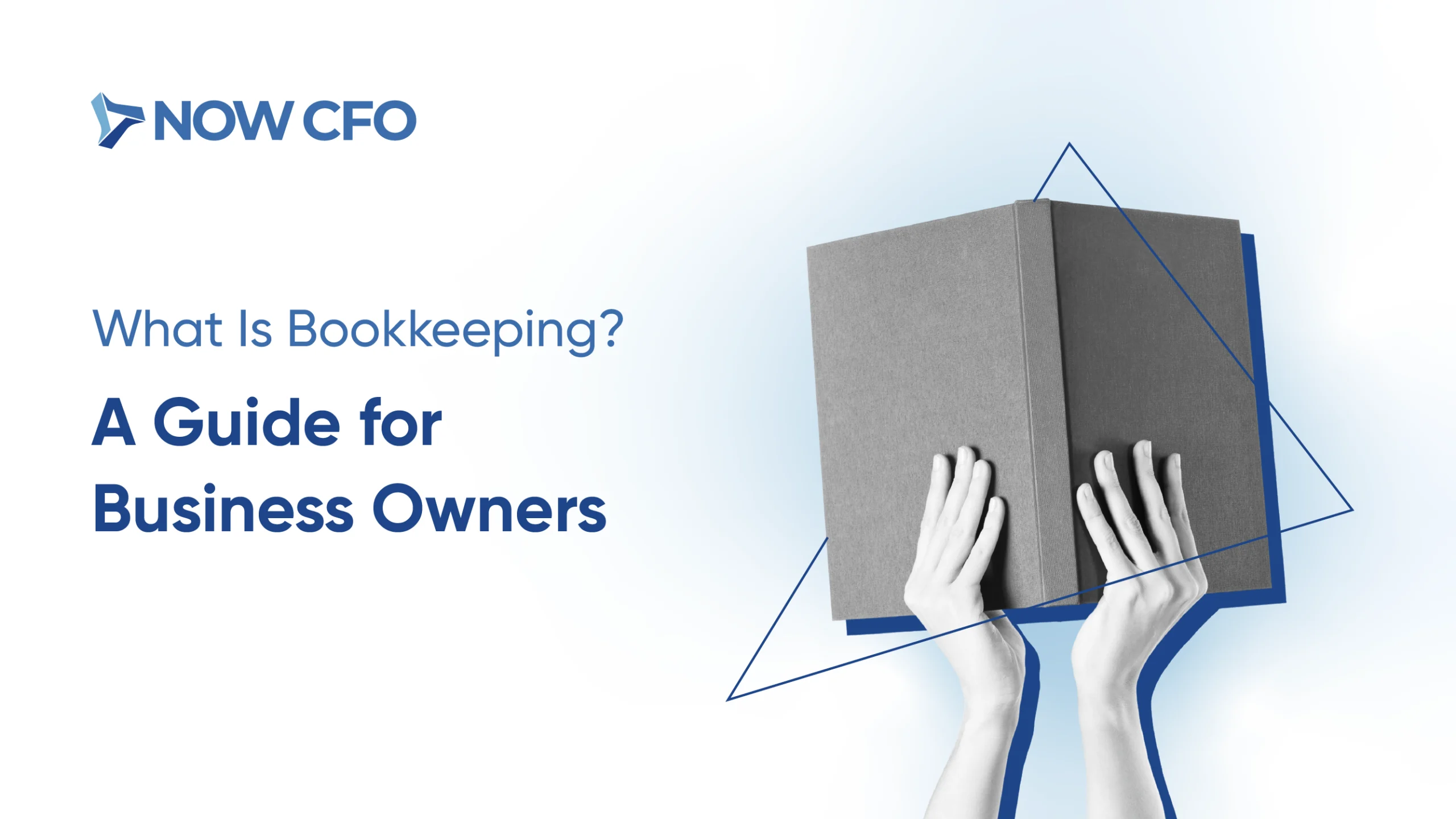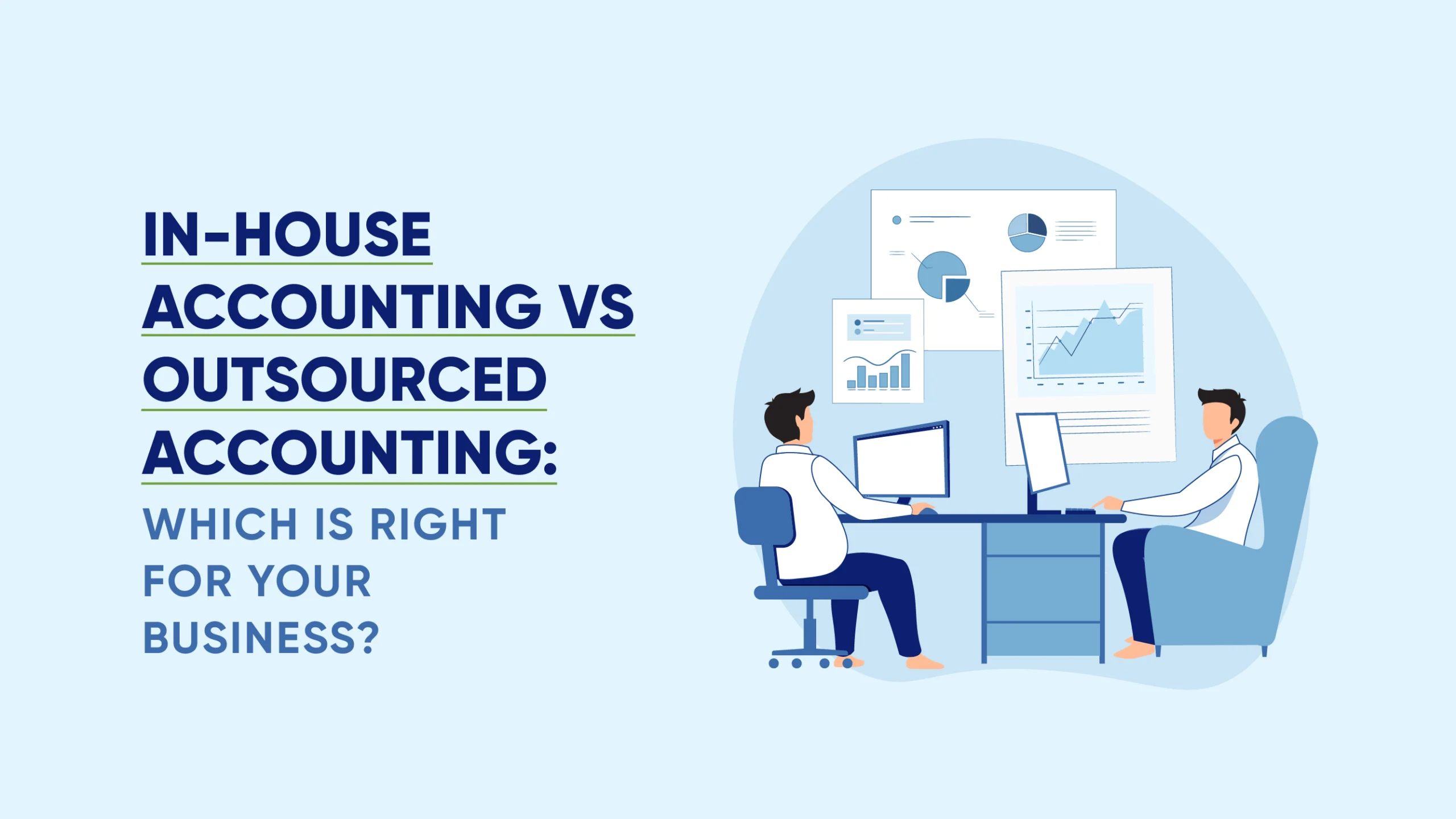
When weighing in-house accounting vs outsourced accounting services, leaders must consider cost, control, and expertise. A 2025 study found that 36.5% of businesses outsourced accounting, legal, or professional services.
Understanding the Basics: What is an In-House Accounting Team?
An in-house accounting team consists of dedicated employees who work solely for your company. These professionals manage day-to-day transactions, payroll, compliance, and reporting on-site or within internal systems.
With employees fully integrated into your operations, they gain a deep understanding of your business. However, this model incurs substantial in-house accountant costs, including full salaries, benefits, office space, training, and software licenses.
What is an Outsourced Accounting Service?
An outsourced accounting service involves contracting external professionals or firms to manage financial operations remotely. Services typically cover bookkeeping, payroll, tax preparation, economic analysis, and compliance.
Companies benefit from accessing specialized expertise (e.g., CFOs, analysts) without having to maintain a full-time staff. This outsourced accounting vs. internal accounting model often follows flexible pricing.
Why Businesses Choose One Over the Other
Businesses weigh strategic trade-offs when deciding between models:
| Decision Factor | In-House Accounting Team | Outsourced Accounting Service |
|---|---|---|
| Control vs Flexibility | Immediate, day-to-day management with direct oversight | Scalable support ideal for fluctuating or fast-growing needs |
| Cost Predictability | Predictable but high in-house accountant costs, including salaries, benefits, and overhead | Lower fixed costs with predictable monthly or usage-based pricing structures |
| Expertise Access | Limited in scope to the experience of internal staff | On-demand access to CPAs, CFOs, analysts, and tax specialists |
| Growth Stage Alignment | Suitable for mature or larger companies with industry-specific compliance needs | Ideal for startups or lean companies seeking agility and broad skill sets |
Cost Comparison
Salaries, Benefits, and Overhead of In-House Teams
Businesses must cover full salaries, benefits, training, software licenses, and workspace to maintain an in-house accounting team. BLS reports that the median annual wage for bookkeeping and auditing clerks is $49,210, whereas accountants and auditors earned a median of $81,680 annually.
Here’s a breakdown of core cost elements:
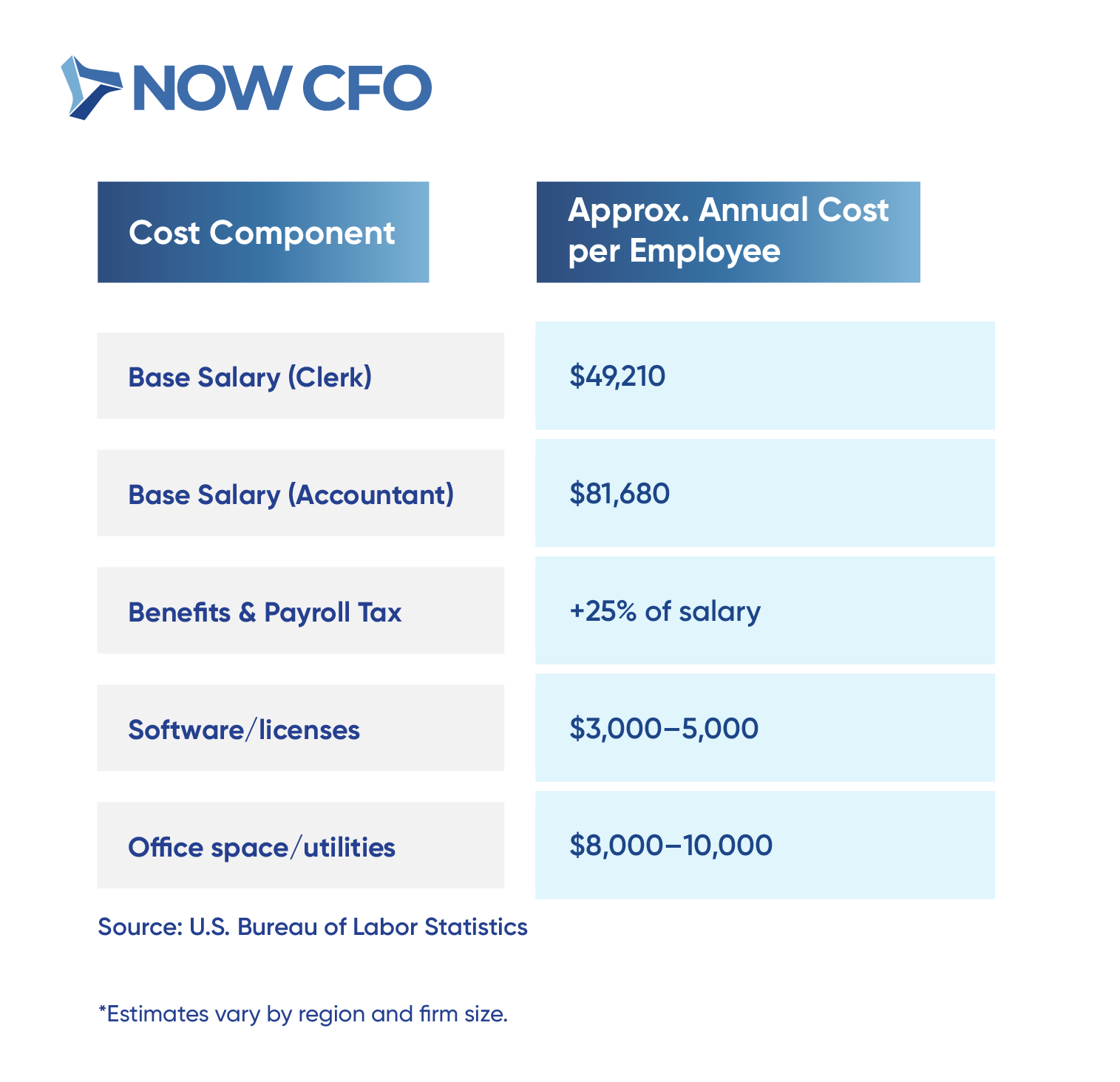
Pricing Models of Outsourced Accounting Firms
Outsourced providers typically charge based on usage or service tier: hourly rates, fixed monthly retainers, or bundled pricing. Models vary:
| Pricing Model | Typical Cost Range | Best Use Case |
|---|---|---|
| Hourly | $75–$150/hr | Startups/occasional needs |
| Retainer | $1K–$5K/month | Growing businesses with steady needs |
| Bundled tiers | Varies by provider | Scaling ops needing CFO-level support |
Scalability and Flexibility of Outsourced Services
An outsourced accounting service offers unmatched scaling flexibility. You can ramp up support for tax season, audits, or fundraising and then scale back.
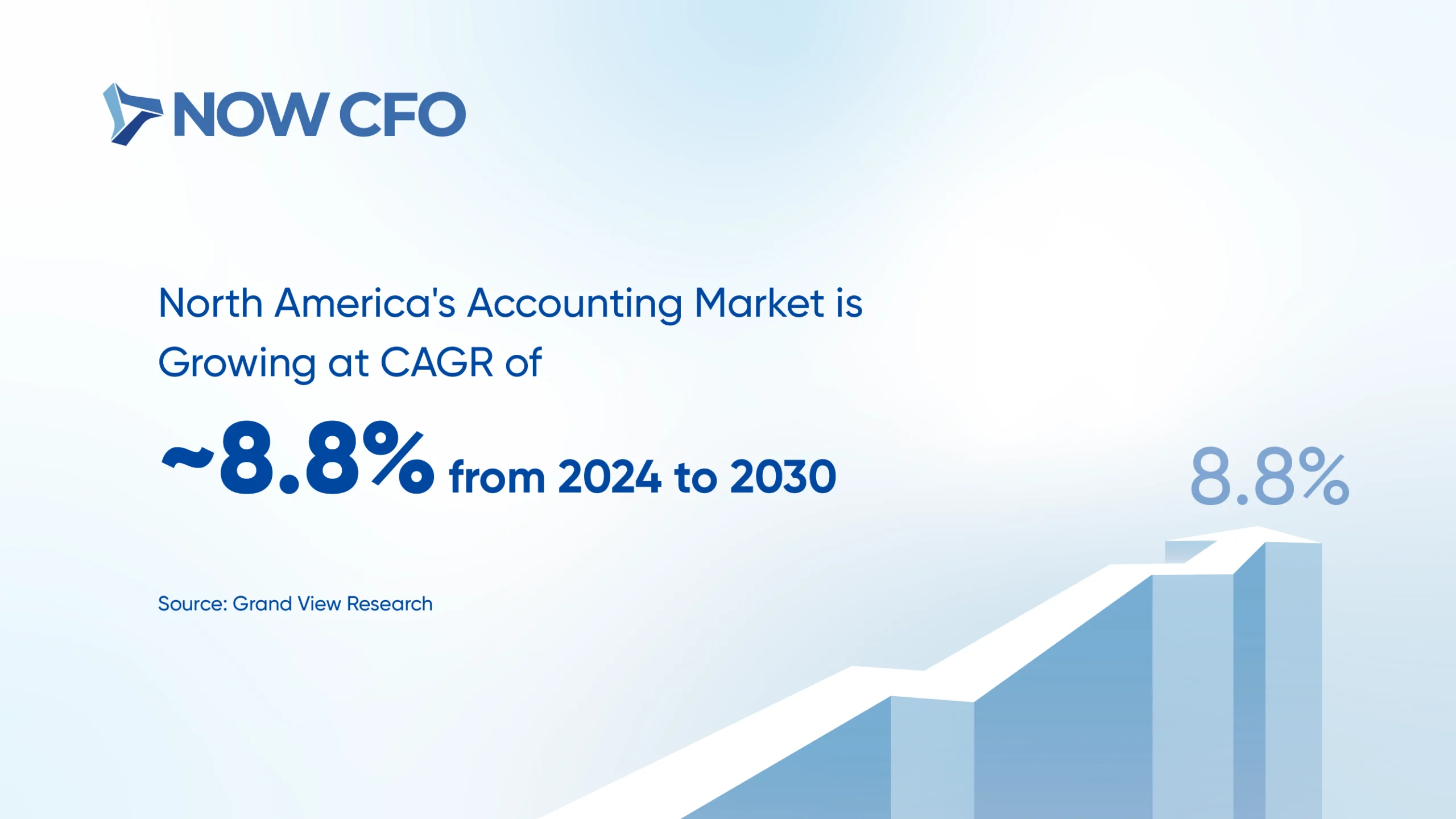
External firms offer wide-ranging financial expertise, including remote CFOs, tax specialists, and financial analysts, available exactly when needed. This flexibility enables startups and growing businesses to adjust financial support based on shifting operational demands and evolving priorities.
Learn More: Outsourcing Accounting Growth
Efficiency and Expertise
Skill Depth in Outsourced Accounting vs In-House Accounting
Outsourced firms assemble a collective of professionals specializing in different financial verticals. They invest in ongoing training to maintain certification standards.
In contrast, in-house accounting teams often rely on a few generalists with limited bandwidth to master all functions.
74% of accounting firms struggle to fill specialized roles, impacting skill depth. Meanwhile, outsourced providers offer access to niche expertise on demand, eliminating the need to recruit and train.
Access to Specialists (CFOs, CPAs, Analysts)
Connecting with deep expertise often tips the scales. Outsourced firms grant immediate access to senior specialists:
- Fractional CFOs: They offer high-level financial leadership, guiding strategic decisions such as budgeting, forecasting, fundraising, and long-term planning. They help companies set financial goals, interpret complex data, and prepare for investor presentations.
- Certified Public Accountants (CPAs): CPAs ensure accurate tax preparation, compliance with local and federal regulations, and support during audits. Their expertise helps businesses reduce risk and avoid costly penalties, particularly during critical reporting periods.
- Financial Analysts: Analysts dive into performance metrics, track KPIs, and generate financial models that aid decision-making. Their insights help companies monitor profitability, identify cost-saving opportunities, and forecast financial outcomes with precision.
Turnaround Time and Software Automation
Outsourced accounting services often streamline workflows through advanced cloud-based systems and automation tools. Routine tasks are handled swiftly via software that syncs with banking and ERP systems.
In contrast, in-house teams may lag due to fragmented tools, manual data entry, or software maintenance issues. As automation displaces repetitive tasks, internal teams must invest more time in system training and updates, further eroding productivity.
Support During Tax Season, Audits, or Fundraising
Businesses require additional expertise and headcount during high-stakes events—tax season, audits, and fundraising.
- Tax Season: Outsourced firms ramp up services with senior tax CPAs, ensuring accurate preparation and compliance during peak filings.
- Audit Support: Professional audit teams manage documentation, liaise with external auditors, and resolve inquiries efficiently.
- Fundraising: Analysts and CFO consultants prepare valuation models, investor decks, and due diligence reports.
Control, Access, and Communication
Day-To-Day Visibility of In-House Staff
An in-house accounting team offers constant, on-site visibility. Employees work with other departments, allowing real-time access to financial data, immediate responses to inquiries, and daily collaboration. This ensures tight integration with company culture, processes, and internal stakeholders.
In contrast, external teams lack this immersion, which may hamper responsiveness. Relying on emails or scheduled updates, outsourced providers risk delays in catching issues like unusual expenses or reconciliation errors.
Managing Communication with Outsourced Teams
- Scheduled Meetings: Regular video check-ins (weekly or biweekly) maintain alignment.
- Defined SLAs: Clear service-level agreements set expectations on response times and deliverables.
- Dedicated Liaisons: Assigning internal points of contact streamlines coordination.
- Progress Dashboards: Shared dashboards monitor tasks, invoices, and KPIs in real time.
Tools That Enable Transparency with Outsourcing
Modern tools ensure visibility even when teams operate remotely:
- Cloud Accounting Platforms: Tools like QuickBooks Online or Xero provide real-time access to financials.
- Collaboration Suites: Slack, Teams, or Asana enable seamless discussions, file-sharing, and task assignments.
- Dashboard Software: BI tools such as Tableau or Power BI present live KPIs and cash-flow metrics.
- Audit Trails: Cloud system access logs record every change, enhancing accountability and trust.
Learn More: Benefits of Hiring an Outsourced Accounting Service
When to Choose an Outsourced Accounting Service
Ideal for Startups and Fast-Growing Businesses
Startups and rapidly scaling companies often operate under tight budgets and unpredictable growth. An outsourced accounting service enables founders to allocate capital toward core activities while accessing professional financial management.
Cost-Conscious or Lean Teams
When budgets strain lean teams, outsourced accounting vs internal accounting becomes critical.
- Variable spending: Only pay for services as needed, no fixed salary or benefits.
- Reduced overhead: Save on software, training, and workspace costs.
- Lean operations: Tap into one-person virtual accounting teams for basic bookkeeping up to CFO-level insights.
Companies Scaling Across Multiple Locations
As businesses expand into new cities or countries, consistency in accounting practices becomes vital.
- Standardized processes: Outsourced firms implement unified systems across locations, reducing errors.
- Centralized reporting: Consolidated dashboards clarify cash flow, payroll, and compliance across sites.
- Local expertise: Providers often maintain regional specialists aware of varying tax and labor laws.
Need for Flexibility and Wide-Ranging Financial Expertise
Rapid change and complex financial tasks demand flexible, expert support.
- Modular services: Outsourced firms adjust service levels during seasonal peaks, audits, or fundraising.
- Specialist access: Engage CPAs, fractional CFOs, and analysts on-demand.
- Advanced tools: Benefit from cloud accounting, automation, and real-time insights without capital investment.
Learn More: Hire an Outsourced Accounting Service
Making the Right Decision for Your Business
To make the right choice, business leaders must weigh both cost and strategic alignment. Applying practical decision-making frameworks helps determine which accounting model best supports long-term business goals.
Key Questions to Ask Before Choosing
Ask targeted questions to weigh your options:
- What is our current monthly transaction volume, and how might it change in 12 months?
- Can we afford full-time salaries, benefits, and training, or do we need variable costs?
- Do we require industry-specific compliance or frequent on-site financial presence?
- How critical is day-to-day financial visibility vs periodic strategic insight?
- Are we scaling to new locations and need local tax/regulatory support?
Creating a Cost-Benefit Analysis
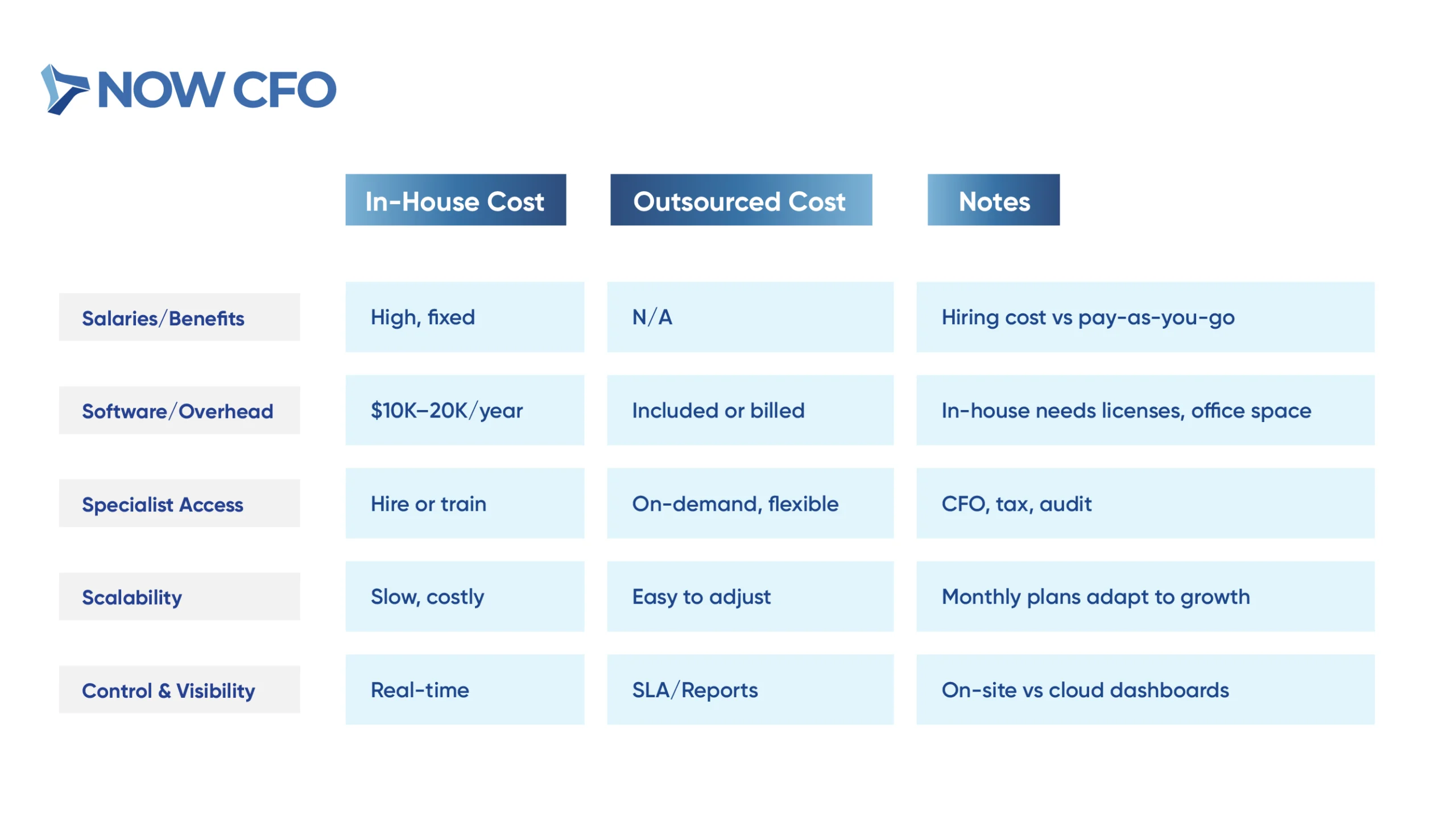
How NOW CFO Supports Both Models
NOW CFO offers hybrid solutions tailored to business needs:
- Embedded In-House Teams: We staff qualified controllers, bookkeepers, or CFOs who operate on-site or within your systems, delivering day-to-day financial oversight and compliance expertise.
- Fully Outsourced Services: We provide scalable bookkeeping, fractional CFOs, tax support, and audit prep for companies.
- Modular Model: Transition seamlessly between in-house and outsourced support as your business grows or your needs change. You gain continuity with minimal disruptions.
- Tools and security: We implement cloud platforms, dashboards, and robust data protocols to ensure transparency and data security.
Conclusion
If you’re ready to explore, NOW CFO can support you every step of the way. Let’s tailor an accounting strategy that aligns with your operational needs and financial targets. Reach out to schedule a complimentary strategic session.
